Unit 8 Lesson 45 Different Manners课件+音频(共21张PPT,含内嵌视频)冀教版九年级全册
文档属性
| 名称 | Unit 8 Lesson 45 Different Manners课件+音频(共21张PPT,含内嵌视频)冀教版九年级全册 | 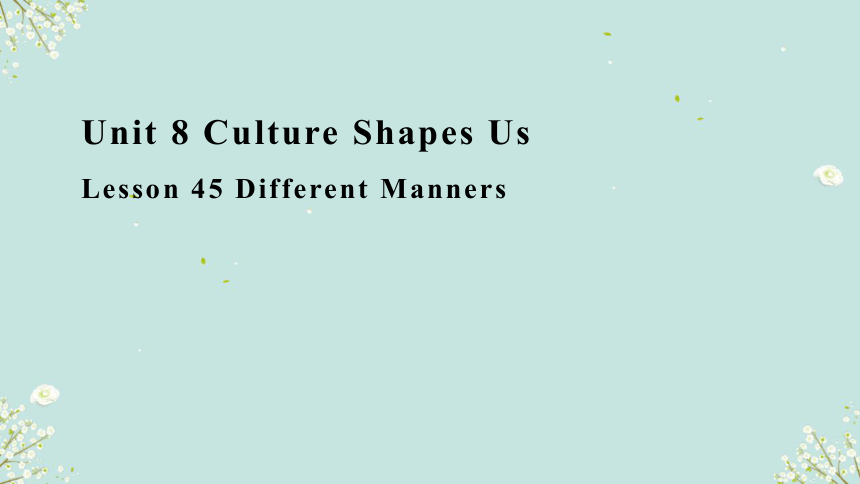 | |
| 格式 | pptx | ||
| 文件大小 | 54.3MB | ||
| 资源类型 | 教案 | ||
| 版本资源 | 冀教版 | ||
| 科目 | 英语 | ||
| 更新时间 | 2024-08-25 11:28:35 | ||
图片预览

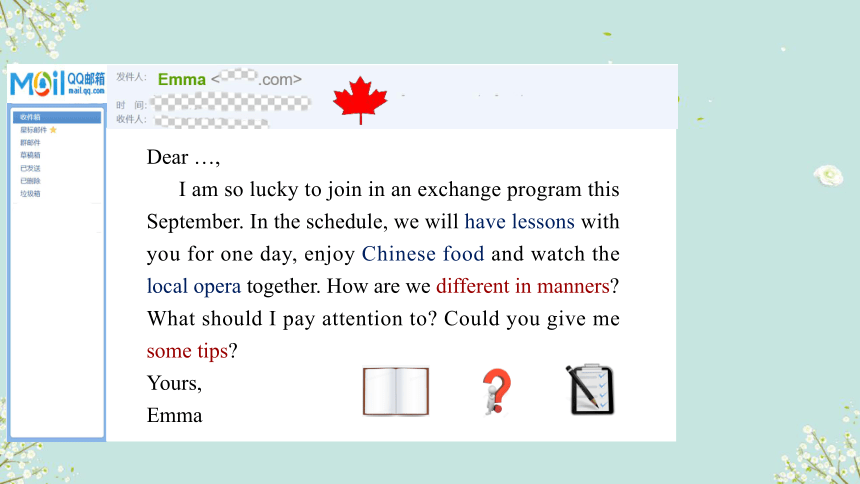
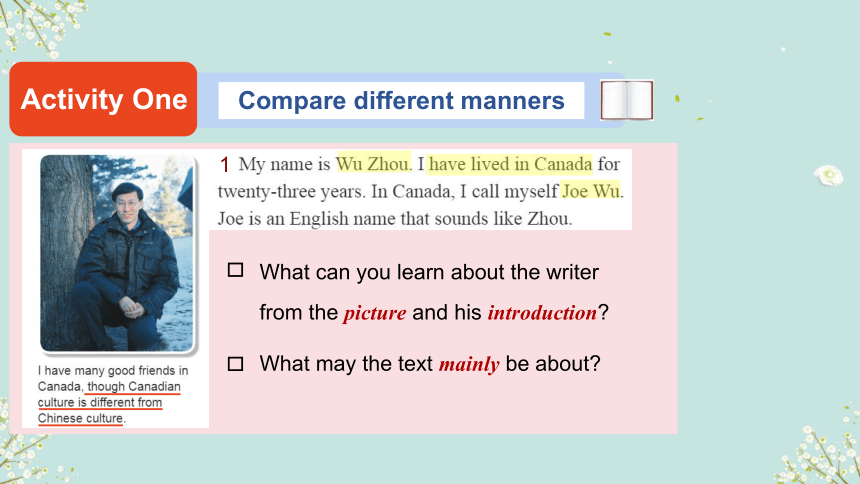
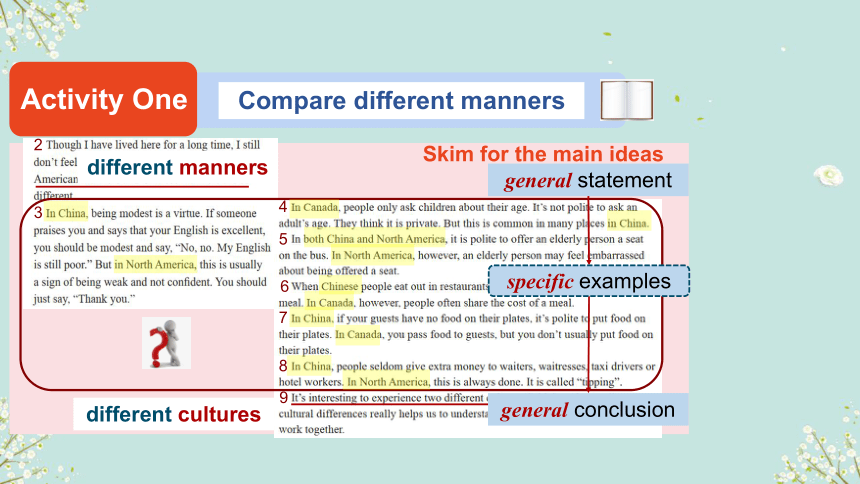
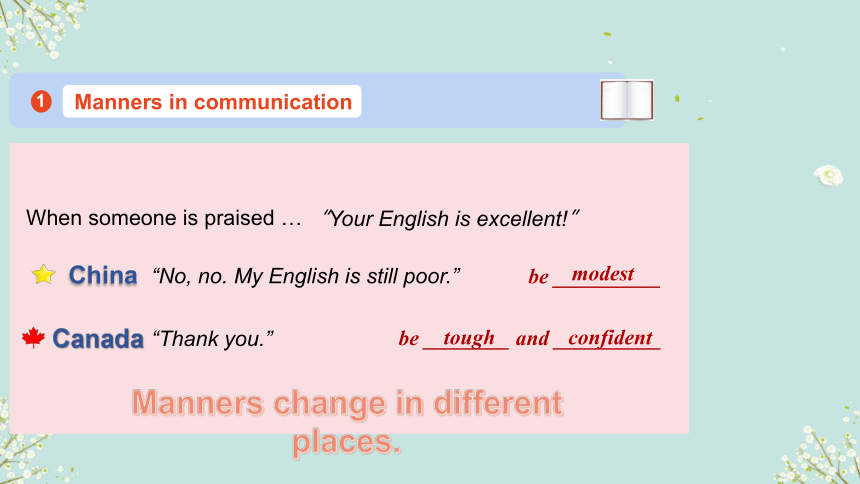
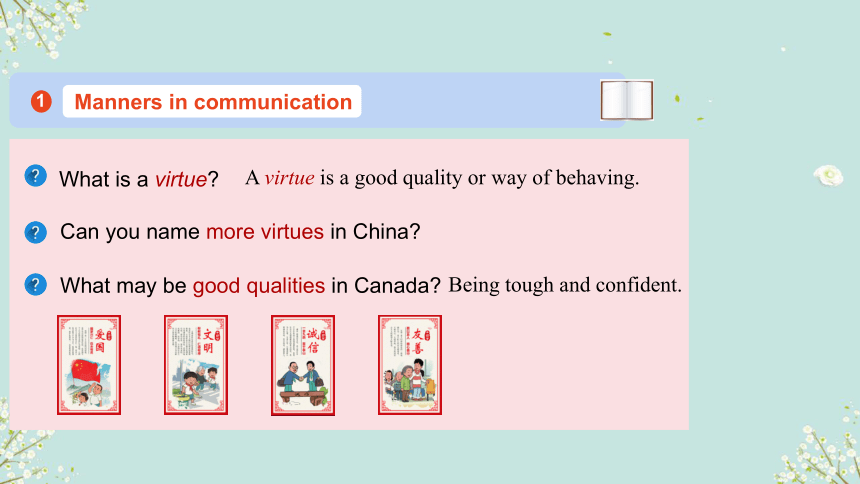
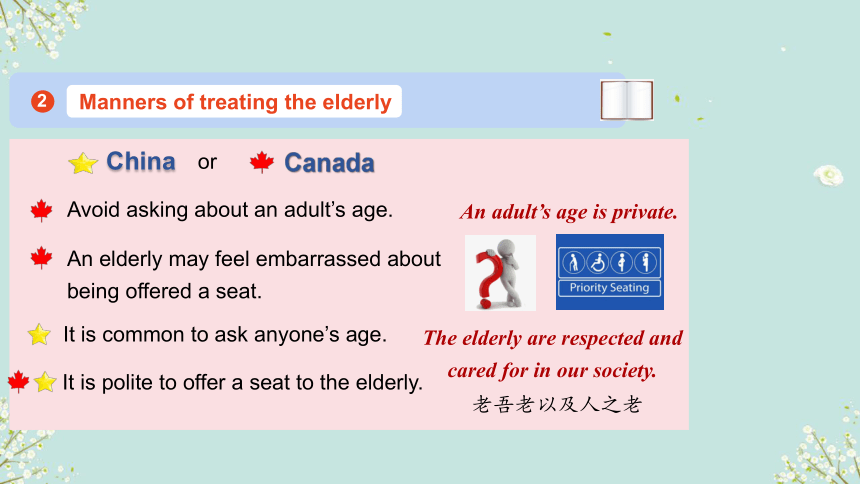

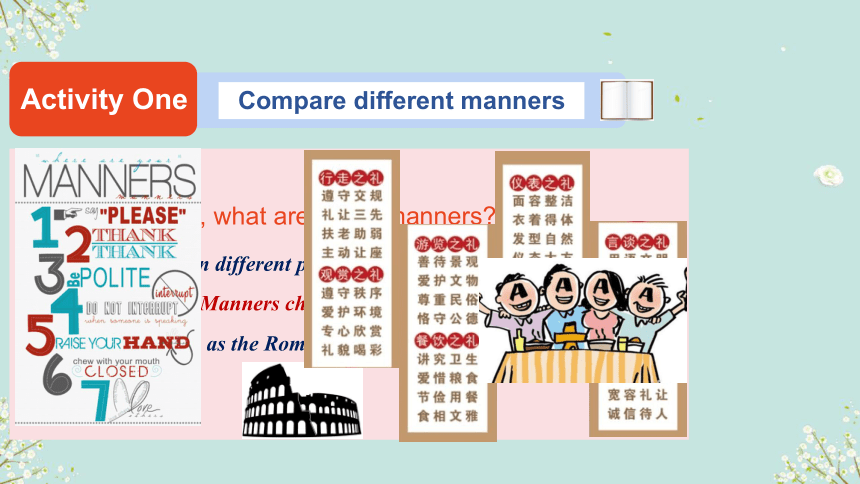
文档简介
(共21张PPT)
Unit 8 Culture Shapes Us
Lesson 45 Different Manners
Dear …,
I am so lucky to join in an exchange program this September. In the schedule, we will have lessons with you for one day, enjoy Chinese food and watch the local opera together. How are we different in manners What should I pay attention to Could you give me some tips
Yours,
Emma
Activity One
Compare different manners
What can you learn about the writer from the picture and his introduction
What may the text mainly be about
1
Skim for the main ideas
2
3
4
5
6
7
8
9
different manners
different cultures
general statement
general conclusion
specific examples
Compare different manners
Activity One
“Your English is excellent!”
China
When someone is praised …
be __________
be ________ and __________
“No, no. My English is still poor.”
“Thank you.”
tough
confident
modest
1
Manners in communication
Manners change in different places.
Canada
1
Manners in communication
What is a virtue
A virtue is a good quality or way of behaving.
Being tough and confident.
Can you name more virtues in China
What may be good qualities in Canada
2
Manners of treating the elderly
Avoid asking about an adult’s age.
It is polite to offer a seat to the elderly.
It is common to ask anyone’s age.
An elderly may feel embarrassed about being offered a seat.
or
An adult’s age is private.
老吾老以及人之老
The elderly are respected and cared for in our society.
China
Canada
3
Manners in the restaurants
When dining in restaurants
When welcoming the guests
When receiving service in public
take turns to pay
share the cost
put food on their plates
pass food to them
seldom give extra money
always leave a tip
1
2
3
4
5
6
Activity One
Discussion
In your opinion, what are good manners
Compare different manners
When in Rome, do as the Romans do.
入乡随俗
Manners change in different places.
Manners change as time goes by.
Activity One
Retell different manners. Add more examples if you can.
Compare different manners
Activity Two
values on virtue
attitudes towards the elderly
opinions on privacy
cultural changes
Compare cultural differences
can be seen
can not be seen
Activity Two
Compare the scenes and infer(推断) possible cultural differences.
Compare cultural differences
Activity Two
Activity Two
West
East
group
individual
(个人)
ME
WE
Culture __________ manners.
Compare cultural differences
shapes
different manners
different cultures
Activity Two
How does Joe feel about the differences
I have many good friends in Canada, though Canadian culture is different from Chinese culture.
Though I have lived here for a long time, I still don’t feel Canadian.
It’s interesting to experience two different cultures.
He feels
different from Canadians.
a friendly living environment.
interested to experience.
Compare cultural differences
Activity Two
“ I think understanding cultural differences really helps us to understand each other, live together and work together.”
Although there are cultural differences,
_______________________________.
Compare cultural differences
difference —— understanding
conflict —— cooperation
(冲突) (合作)
Note that we should not use “although/though” and “but” in the same sentence.
Activity Three
Write down tips
Work in groups of four. Write down some tips for Emma.
Choose from the following tasks of different levels.
1) Introduce manners mentioned by Joe.
2) Describe proper manners at the three scenes.
3) Explain cultural reasons for the differences.
Try to include sentences introduced by though or although.
Activity Three
Write down tips
Dear Emma,
Here is my tip for you about manners in __________. ____________________________________________________________________________________________________________________________________________________________________________________________________________________________________________________________________
Activity Three
Write down tips
Here is an example:
Dear Emma,
Here is my tip for you about manners at school.
In China, respecting teachers is important manners at school. Although there are many ways of greeting a teacher, we need to stand up and bow to the teacher at the beginning of a class. Bowing is a formal greeting to show respect for teachers.
Self evaluation
describe different manners.
talk about cultural differences.
use although/though to connect sentences.
Check if I can
Details
Result
Result :
Excellent!
Good!
Not bad!
Homework
You need to:
Draw a mind map to show different manners and the cultural differences.
You can choose to:
Introduce some Chinese manners in English.
Search for more cultural differences between East and West. Prepare to share next class.
Unit 8 Culture Shapes Us
Lesson 45 Different Manners
Dear …,
I am so lucky to join in an exchange program this September. In the schedule, we will have lessons with you for one day, enjoy Chinese food and watch the local opera together. How are we different in manners What should I pay attention to Could you give me some tips
Yours,
Emma
Activity One
Compare different manners
What can you learn about the writer from the picture and his introduction
What may the text mainly be about
1
Skim for the main ideas
2
3
4
5
6
7
8
9
different manners
different cultures
general statement
general conclusion
specific examples
Compare different manners
Activity One
“Your English is excellent!”
China
When someone is praised …
be __________
be ________ and __________
“No, no. My English is still poor.”
“Thank you.”
tough
confident
modest
1
Manners in communication
Manners change in different places.
Canada
1
Manners in communication
What is a virtue
A virtue is a good quality or way of behaving.
Being tough and confident.
Can you name more virtues in China
What may be good qualities in Canada
2
Manners of treating the elderly
Avoid asking about an adult’s age.
It is polite to offer a seat to the elderly.
It is common to ask anyone’s age.
An elderly may feel embarrassed about being offered a seat.
or
An adult’s age is private.
老吾老以及人之老
The elderly are respected and cared for in our society.
China
Canada
3
Manners in the restaurants
When dining in restaurants
When welcoming the guests
When receiving service in public
take turns to pay
share the cost
put food on their plates
pass food to them
seldom give extra money
always leave a tip
1
2
3
4
5
6
Activity One
Discussion
In your opinion, what are good manners
Compare different manners
When in Rome, do as the Romans do.
入乡随俗
Manners change in different places.
Manners change as time goes by.
Activity One
Retell different manners. Add more examples if you can.
Compare different manners
Activity Two
values on virtue
attitudes towards the elderly
opinions on privacy
cultural changes
Compare cultural differences
can be seen
can not be seen
Activity Two
Compare the scenes and infer(推断) possible cultural differences.
Compare cultural differences
Activity Two
Activity Two
West
East
group
individual
(个人)
ME
WE
Culture __________ manners.
Compare cultural differences
shapes
different manners
different cultures
Activity Two
How does Joe feel about the differences
I have many good friends in Canada, though Canadian culture is different from Chinese culture.
Though I have lived here for a long time, I still don’t feel Canadian.
It’s interesting to experience two different cultures.
He feels
different from Canadians.
a friendly living environment.
interested to experience.
Compare cultural differences
Activity Two
“ I think understanding cultural differences really helps us to understand each other, live together and work together.”
Although there are cultural differences,
_______________________________.
Compare cultural differences
difference —— understanding
conflict —— cooperation
(冲突) (合作)
Note that we should not use “although/though” and “but” in the same sentence.
Activity Three
Write down tips
Work in groups of four. Write down some tips for Emma.
Choose from the following tasks of different levels.
1) Introduce manners mentioned by Joe.
2) Describe proper manners at the three scenes.
3) Explain cultural reasons for the differences.
Try to include sentences introduced by though or although.
Activity Three
Write down tips
Dear Emma,
Here is my tip for you about manners in __________. ____________________________________________________________________________________________________________________________________________________________________________________________________________________________________________________________________
Activity Three
Write down tips
Here is an example:
Dear Emma,
Here is my tip for you about manners at school.
In China, respecting teachers is important manners at school. Although there are many ways of greeting a teacher, we need to stand up and bow to the teacher at the beginning of a class. Bowing is a formal greeting to show respect for teachers.
Self evaluation
describe different manners.
talk about cultural differences.
use although/though to connect sentences.
Check if I can
Details
Result
Result :
Excellent!
Good!
Not bad!
Homework
You need to:
Draw a mind map to show different manners and the cultural differences.
You can choose to:
Introduce some Chinese manners in English.
Search for more cultural differences between East and West. Prepare to share next class.
同课章节目录
- Unit 7 Work for Peace
- Lesson 37 Don't Fight!
- Lesson 38 Making School a Better Place
- Lesson 39 The Dove and the Olive Branch
- Lesson 40 The UN—Power of Words
- Lesson 41 Jenny's Good Advice
- Lesson 42 Peace at Last
- Unit Review
- Unit 8 Culture Shapes Us
- Lesson 43 A Visit to Chinatown
- Lesson 44 Popular Sayings
- Lesson 45 Different Manners
- Lesson 46 Home to Many Cultures
- Lesson 47 Good Manners
- Lesson 48 Supper with the Bradshaws
- Unit Review
- Unit 9 Communication
- Lesson 49 Get Along with Others
- Lesson 50 Tips for Good Communication
- Lesson 51 What Could Be Wrong?
- Lesson 52 The Power of a Smile
- Lesson 53 Working in Groups
- Lesson 54 How Embarrassing!
- Unit Review
- Unit 10 Get Ready for the Future
- Lesson 55 Look into the Future
- Lesson 56 Manage Your Time
- Lesson 57 Best Wishes
- Lesson 58 Ms.Liu's Speech
- Lesson 59 Keep Your Choices Open
- Lesson 60 Get a Good Education
- Unit Review
